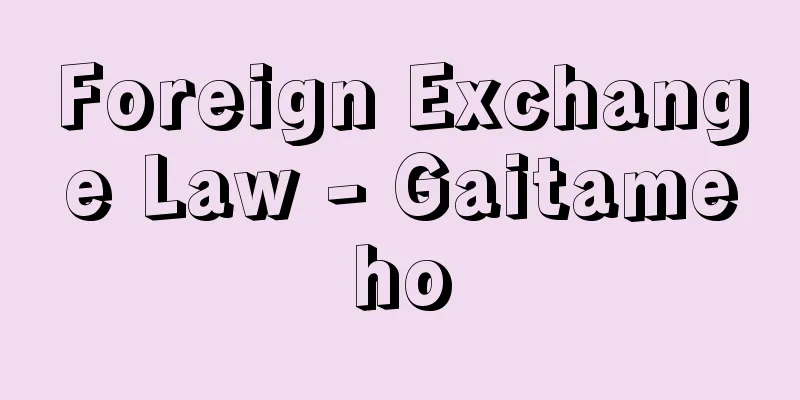Foreign Exchange Law - Gaitameho

|
This law is intended to manage and regulate foreign transactions such as foreign exchange and foreign trade, with the aim of ensuring the normal development of Japan's foreign trade and maintaining peace and security in the international community. Its official name is the Foreign Exchange and Foreign Trade Act. It applies to foreign transactions such as the transfer of funds, goods, and services between Japan and other countries, and to foreign currency-denominated transactions between residents. The purpose of the Foreign Exchange Law is to "ensure the normal development of foreign trade, based on the free conduct of foreign exchange, foreign trade, and other foreign transactions." However, in times of emergency, the law also aims to provide the minimum necessary control or adjustment of foreign trade, taking into consideration the maintenance of peace and security in the international community, the balance of payments, currency stability, and the sound development of the Japanese economy. Therefore, the current law is based on free trade, with minimal control. However, its origins lie in the Foreign Exchange Control Law, which was intended to control foreign trade before the war. After Japan's defeat in the war, the law came under the control of GHQ (General Headquarters of the Allied Powers), and private trade was partially resumed. In 1949, the law was enacted under the former name of the Foreign Exchange and Foreign Trade Control Law. However, as the name "Control Law" suggests, the main purpose of the law was to ensure the balance of payments and currency stability, and it was intended to place foreign exchange and foreign trade under strict government control. For this reason, economic and currency transactions with foreign countries were prohibited in principle, and were permitted as an exception if prior authorization was obtained. In addition, foreign exchange transactions were called the "foreign exchange bank principle," and it was stipulated that they had to be conducted through foreign exchange banks authorized under the law (official foreign exchange banks, foreign exchange banks) or specialized foreign exchange banks (Bank of Tokyo) under the Foreign Exchange Bank Law. This changed dramatically with the revision of the law in 1980, which transformed the legal system into one in which foreign transactions were free in principle. The subsequent revision of the law in 1998 abolished the prior authorization and notification system in principle, abolished the foreign exchange bank principle, and deleted the two characters "management" from the name of the law, completely changing the fundamental direction of the law. It also stipulated that measures such as economic sanctions could be taken when it was necessary to fulfill treaties and international agreements concluded by Japan, or when it was deemed particularly necessary for Japan to contribute to international efforts for world peace. In addition, certain restrictions can be imposed on foreign direct investment that could harm national security, and based on this, foreign investment restrictions have been established for industries such as aircraft and nuclear power. The government announced that the scope of these foreign investment restrictions will be expanded to the IT (information technology) sector from August 2019. From the perspective of national security, 20 industries will be added, including manufacturing of mobile phones, electronic computers, semiconductor memory, and software development, and prior notification will be required for the acquisition of 10% or more of the shares of listed companies or the acquisition of shares of unlisted companies. If problems are found as a result of the review, the government can recommend or order the modification or cancellation of the plan. The background to this is thought to be that it is in line with the tough stance of the Trump administration against China, and is also aimed at preventing the outflow of technology to foreign countries, such as China, which has become a problem in recent years. (Writer Toshihide Kanaya/2019) Source : "Chiezo" published by Asahi Shimbun Publications Co., Ltd. About Chiezo |
|
日本の対外取引の正常な発展や国際社会の平和や安全の維持を目的として、外国為替や外国貿易などの対外取引の管理や調整を行うための法律。正式名称は、外国為替及び外国貿易法。日本と外国の間で行われる資金や財、サービスの移動などの対外取引や、居住者間での外貨建て取引に適用される。 外為法はその目的を、「外国為替、外国貿易その他の対外取引が自由に行われることを基本とし、対外取引の正常な発展」を図るとしている。ただし、有事にあっては国際社会の平和・安全の維持、国際収支の均衡や通貨の安定、日本経済の健全な発展等に鑑み、対外取引に対し必要最小限の管理又は調整を行うことも、また法の目的としている。したがって、現在の同法は、管理は最低限にとどめ、自由貿易を基本とするものである。しかし、その源流は戦前の対外取引を管理することを目的とした外国為替管理法にある。敗戦によりGHQ(連合国軍総司令部)の管理に移り、民間貿易が一部再開されると共に、1949年に旧称「外国為替及び外国貿易管理法」が新たに制定された。ただし、「管理法」の名の通り、国際収支の均衡と通貨の安定を図ることなどを主目的とし、外国為替や外国貿易を厳格に政府の管理下に置くための法だった。このため、外国との経済取引、通貨の取引は原則として禁止され、事前に許認可を受けた場合に特例として許された。また、外為取引は「為銀主義」と呼ばれ、同法の認可を受けた外国為替銀行(外国為替公認銀行・為銀)や外国為替銀行法に基づく外国為替専門銀行(東京銀行)を通じて行わなければならないと定められていた。これが大きく変わるのは80年の改正で、対外取引は原則自由とする法体系へと転換された。続いて、98年の改正では事前の許可・届け出制度が原則として廃止され、為銀主義も廃止され、法の名からも「管理」の2字が削除され法の根本的な方向が完全に変わった。また、日本が締結した条約や国際約束を履行するため必要があるときや、国際平和のための国際的な努力に日本として寄与するため特に必要があると認めるときなどについては、経済制裁などの措置を講ずることができるとした。 なお、外国資本を招き入れる直接対内投資については、国の安全を損なうものなどについては一定の制限を加えることができ、これに基づいて航空機や原子力関連などの業種では外資による投資規制が定められている。政府はこの外資規制の対象を、2019年8月からIT(情報技術)分野にも拡大することを発表した。国の安全保障の観点から、携帯電話や電子計算機、半導体メモリーなどの製造業やソフトウェア開発など20業種が追加され、上場企業の株式を10%以上取得したり、非上場企業の株式を取得したりする場合には事前の届け出が求められ、審査の結果、問題が見つかれば政府は計画の変更や中止を勧告・命令できる。その背景として、米トランプ政権の中国に対する強硬姿勢に同調すると共に、近年、問題化している中国など外国への技術流出を防ぐことが狙いと見られている。 (金谷俊秀 ライター/2019年) 出典 (株)朝日新聞出版発行「知恵蔵」知恵蔵について 情報 |
>>: Foreign exchange securities - Gaitameshoken
Recommend
Riverbed Lake - Kasekiko
A lake formed in the old course of a river. An ox...
Radical axis
The locus of points P with equal powers of two cir...
Living shrine - Seishi
A living person is worshiped as a god and a shrin...
Bishop of the Sea
…In the legend, they are femme fatales who bring ...
greater hedgehog-tenrec
...The life span in captivity is about 5 years. T...
Alan Lomax
1915‐2002 American folk song researcher and ethnom...
Tibeto-Burman - Tibeto-Burman
A group of languages widely distributed in the w...
Uhiki - Cormorant pulling
Other old-fashioned fishing methods include dokun...
Hausknecht, Emile
[Born] 1853 [Died] 1927. A German educator from Lo...
Brother Naori - Brother Naori
…In this case, the newborn child is treated as th...
Limbic lobe
…Originally, it is a phylogenetically ancient cor...
Mastodonsaurus
…The head is large and flat, with eyes facing upw...
Okamoto Awadayu - Okamoto Awadayu
…Fumiaki's narration includes "Forty-eig...
House of Councillors - Sangiin
The Senate is the single chamber that, together w...
Kamikarikura
...A type of costume from the Heian period onward...




![Kasumi [town] - Kasumi](/upload/images/67cb347d9776d.webp)



![Tonbara [town] - Tonbara](/upload/images/67cc60f9622c5.webp)
